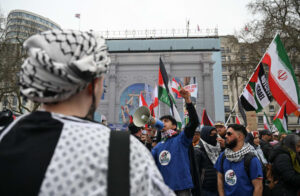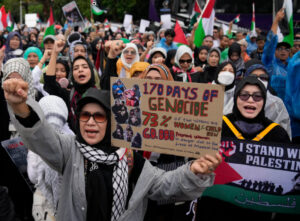Quds Day: The Origins of a Global Movement
Quds Day, an annual event held on the last Friday of Ramadan, stands as a powerful symbol of solidarity with the Palestinian people and opposition to Zionism and Israeli occupation.
This day was first established in 1979 by Ayatollah Ruhollah Khomeini, the leader of Iran’s Islamic Revolution, with the aim of drawing global attention to the plight of Palestinians and the significance of Jerusalem (known as Al-Quds in Arabic).
Since its inception, Quds Day has grown into an international phenomenon, observed not only in Iran but also in numerous countries across the Muslim world and beyond. This article explores the rich history of Quds Day, its political and cultural impact, and how it continues to resonate today.
- Quds Day: The Origins of a Global Movement
- The Birth of Quds Day in Post-Revolutionary Iran
- Why Quds Day Matters: A Response to Jerusalem Day
- The Spread of Quds Day Across the Globe
- The Symbolism of Quds Day in Islamic Culture
- Quds Day and Its Political Implications
- How Quds Day is Observed Worldwide
- Challenges and Controversies Surrounding Quds Day
- The Evolution of Quds Day in the 21st Century
- The Future of Quds Day: A Lasting Legacy
- Conclusion: Quds Day as a Call to Action
The Birth of Quds Day in Post-Revolutionary Iran
The story of Quds Day begins in the wake of Iran’s 1979 Islamic Revolution, a transformative moment that shifted the nation’s political landscape.
Ayatollah Khomeini, recognizing the centrality of Jerusalem to Muslims worldwide, announced the last Friday of Ramadan as Quds Day during a speech on August 7, 1979.
He called on Muslims globally to dedicate this day to protesting Israel’s control over Jerusalem and supporting the Palestinian cause. This move was both a religious and political statement, framing Quds Day as a day of resistance against oppression and imperialism.
By establishing Quds Day, Iran positioned itself as a leader in the fight for Palestinian liberation, a stance that remains a cornerstone of its foreign policy.
Why Quds Day Matters: A Response to Jerusalem Day
Quds Day was partly conceived as a counterpoint to Israel’s Jerusalem Day, which celebrates the unification of Jerusalem under Israeli control following the 1967 Six-Day War. Jerusalem Day, declared a national holiday by Israel’s Knesset in 1998, marks the annexation of East Jerusalem—a move widely contested internationally.
In contrast, Quds Day seeks to challenge this narrative, highlighting the ongoing occupation and advocating for Palestinian rights. The establishment of Quds Day reflects a broader geopolitical struggle, pitting Iran’s revolutionary ideology against Israel’s territorial claims, with Jerusalem at the heart of the conflict.
The Spread of Quds Day Across the Globe
What began as an Iranian initiative quickly transcended borders, with Quds Day gaining traction in countries with significant Muslim populations. By the 1980s, nations like Lebanon, Syria, and Pakistan started holding rallies and demonstrations on Quds Day, often organized by grassroots movements or government bodies sympathetic to the Palestinian cause.
In places like London, Toronto, and New York, diaspora communities also embraced Quds Day, using it as a platform to raise awareness about Palestine. Today, reports suggest that Quds Day events occur in over 80 countries, reflecting its evolution into a global day of protest and solidarity.
The Symbolism of Quds Day in Islamic Culture
Beyond its political roots, Quds Day carries deep religious significance for Muslims. Jerusalem, or Al-Quds, is home to the Al-Aqsa Mosque, one of Islam’s holiest sites and the first qibla (direction of prayer) before Mecca.
Ayatollah Khomeini framed Quds Day as a day of “Islamic revival,” urging Muslims to reclaim their spiritual and historical connection to the city.
This religious dimension has fueled the day’s enduring appeal, inspiring sermons, prayers, and marches that blend faith with activism. For many, participating in Quds Day is both a religious duty and a statement of resistance against injustice.
Quds Day and Its Political Implications
Politically, Quds Day has served as a tool for Iran to amplify its influence in the Middle East and beyond. The day aligns with Iran’s broader anti-Zionist and anti-imperialist agenda, resonating with groups like Hezbollah in Lebanon and other allies in the so-called “Axis of Resistance.”
Critics, however, argue that Quds Day is a vehicle for Iran’s geopolitical ambitions, accusing it of promoting antisemitism—a charge its supporters vehemently deny, insisting it targets Zionism, not Judaism. Regardless of perspective, Quds Day undeniably shapes regional dynamics, often sparking diplomatic tensions and media debates.
How Quds Day is Observed Worldwide
The observance of Quds Day varies by region, but it typically involves mass rallies, speeches, and cultural events. In Iran, millions take to the streets of Tehran and other cities, waving Palestinian flags and chanting slogans against Israel and its allies.
In countries like Malaysia, Indonesia, and Turkey, Quds Day marches draw diverse crowds, including activists and religious leaders. In Western nations, where Friday is a workday, events may shift to weekends, adapting to local contexts.
Artistic expressions, such as the International Quds Day Cartoon Festival launched in 2014, also highlight the day’s global reach, with participants from dozens of countries submitting works condemning Israeli policies.
Challenges and Controversies Surrounding Quds Day
Despite its widespread observance, Quds Day is not without controversy. In some countries, governments impose restrictions on rallies, citing security concerns or diplomatic relations with Israel. Critics in the West often label Quds Day as divisive or propagandistic, pointing to inflammatory rhetoric at some events.
Supporters counter that such criticism overlooks the legitimate grievances of Palestinians and the day’s role in amplifying their voices. These debates underscore the polarizing nature of Quds Day, which continues to evoke strong emotions on all sides of the issue.
The Evolution of Quds Day in the 21st Century
As the 21st century unfolded, Quds Day adapted to new realities, including the rise of social media and global conflicts like the Arab Spring. Online platforms have amplified its message, with hashtags and campaigns spreading awareness far beyond physical rallies.
Recent events, such as the 2023 Israel-Hamas war, have further spotlighted Quds Day, with organizers linking it to contemporary struggles in Gaza and the West Bank. This adaptability ensures that Quds Day remains relevant, resonating with younger generations who see it as part of a broader fight for justice.
The Future of Quds Day: A Lasting Legacy
Looking ahead, Quds Day shows no signs of fading. Its blend of religious fervor, political activism, and global solidarity keeps it a fixture on the international stage. As long as the Israeli-Palestinian conflict persists, Quds Day will likely endure as a rallying cry for those advocating for Palestinian self-determination.
Whether viewed as a unifying force or a point of contention, its legacy—rooted in the vision of Ayatollah Khomeini—continues to shape discourse around one of the world’s most enduring conflicts.
Quds Day
In summary, Quds Day is more than a date on the calendar; it’s a movement that bridges faith, politics, and human rights. From its origins in revolutionary Iran to its current status as a worldwide event, Quds Day reflects the complexities of the Middle East and the global Muslim community’s response to them.
By marking the last Friday of Ramadan as Quds Day, participants reaffirm their commitment to justice for Palestinians, ensuring that the cry for Al-Quds echoes across generations and borders. you can read more about Quds day Here. you can watch more in this regard:



